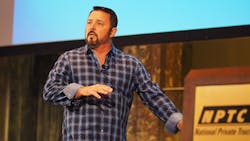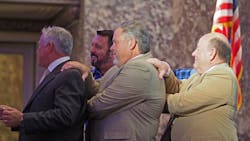CINCINNATI. You couldn't have scripted in nicer weather to kick off a conference — or asked for a more American feel. At the National Private Truck Council's (NPTC) annual meeting here in the Queen City, the group's President and CEO Gary Petty started things Sunday with the Pledge of Allegiance and a prayer for those who protect and serve the nation, and that was followed by a keynote from Operation Desert Storm veteran and former U.S. Navy SEALs sniper Howard Wasdin.
Wasdin was medically discharged from his military service after being shot three times in Mogadishu, Somalia, known as one of the world's most lawless places; his leg was nearly blown off. For those unfamiliar, it was the operation that inspired the movie Black Hawk Down and Wasdin's bestselling book, SEAL Team Six: Memoirs of an Elite Navy SEAL Sniper.
"Would you consider yourself successful in America?" Wasdin asked the audience. Speaking about team-building and leadership, drawing from his harrowing experiences, he asks business leaders that question. It's something of a reality check.
To illustrate the point and his life's experiences, Wasdin asked conference attendees what their earliest memory is. His, he said, is of being abused "by a man reeking of alcohol" — his mother's boyfriend when he was very young — and tasting blood in his mouth from being "slapped around." That troubled, abusive man would later adopt Wasdin. "I was born two months premature to a 15-year-old mother; this was one of her boyfriends she brought around," Wasdin recalled.
"It makes me not real sympathetic with people who say, 'I couldn't accomplish anything because I had a tough childhood,'" he added. And Wasdin capped off that childhood working in the fields in Georgia: "Can you imagine being eight, 10 years old, working in a hot watermelon field, loading day, all that kind of stuff? It didn't kill me, but it definitely wasn't the 'silver spoon' type of existence you see with some successful people."
And incidentally, Wasdin also worked as a truck driver for a time. "I put myself through college driving a Kenworth," he noted. Being abused as a child for years, though, takes "a long time to get over," he emphasized.
"So this is where I am now. I accept no excuses," Wasdin told listeners. "If you're born in the greatest country in the world — and this is the greatest country in the world — or you come here and become a citizen, your 'excuse card' is taken away. And I don't care what kind of card you want to play.
"The way the United States is set up, the way our system is and our society is, if you don't achieve something in life, well by God, you probably didn't want it that bad," he continued. "Or maybe you're one of these people waiting for someone to give it to you."
Doing the right thing
When you assess where you are in life or your success, you may need to refresh your perspective, Wasdin suggested.
"I thought I was winning a lot of times when I really wasn't," he said. Back when he served on SEAL Team Six — more people have played in the Super Bowl than been part of such an elite counter-terrorism team, he noted — Wasdin told of a period when he was "a miserable human being." By that, "I mean a miserable father, a miserable husband; only thing I thought about was doing the deed, doing what was in the team — and everything else suffered," he explained.
"To know you're winning, you've got to define what your accomplishments are. What does 'mission accomplished' mean to you?" Wasdin mused. "Is it just being successful in what you're doing? Is it being successful at your job? Or is it balancing everything out?"
For those who've seen the movie, read the book or know about the military action those were based on — "Operation Gothic Serpent" — Mogadishu apparently was as bad as it's portrayed.
Wasdin touched on that operation, but highlighted one particular memory from Somalia: being at a safe house when something odd happened. He and three other SEAL snipers were there with C.I.A. personnel in the middle of Mogadishu, where the snipers were covering agents as they came and went, gathering intelligence.
"One night up on the roof, I smell this horrible smell," Wasdin said. "I'm like, 'What is that?'"
That situation went on for a few nights. The smell, as the team determined, was coming from a house below where they were holed up.
"A young man had stepped on a land mine. He was going to school in Mogadishu and stepped on this land mine, and the smell was the necrotic tissue on his foot," he said. "It was horrible." Realizing what the source was, "there's the Christian ethic: Do I help this guy?" And many in the audience raised their hands at Wasdin's prompting, indicating they thought the team should have.
"Let me explain the safe house we were in once again. We're responsible for our safety; we're responsible for the people coming and going. If we're compromised, lives will be lost — either indigenous or ours," Wasdin said. "We don't know what clan this guy was from, good or bad. We don't know if his mom or dad are suicide bombers. We know nothing about him. So, should I still go help this guy? Should I still go help this kid?"
That was the team's dilemma, and when the boy started moaning from the pain, they decided to act and risk it. "We said, 'Okay, we're going to do this,'" Wasdin noted. That's not as easy as it sounds: he demonstrated with the audience what it's like to barge in on an unknown, likely unfriendly household in such a place, chest-to-back and in full combat gear, containing any movement once they entered.
And how could the team help this wounded youth who'd been hit with a land mine? The wound had to be cleaned and the rotten tissue scrubbed off, which is called debriding.
"Imagine sitting in a living room and seeing four guys come busting in holding machine guns. You're going to be scared. We had to go in like that because we didn't know who these people were, what their capabilities were. There's a mother, a father, a sister, and what we found out later was an aunt," Wasdin explained. "There might be explosives in the house. There could be people who come in and shoot us.
"I picked the little boy up, take him into the next room" and proceeded to clean the wound, he continued. "What you've got to do is take this little nub which is festered, swollen and painful, holding him down, and scrub that necrotic tissue off. We're doing that, we're giving him shots, we're pumping IVs into the kid.
"Guess what he's doing the whole time? Screaming his head off. Now, if you're mom or dad in the next room with your head against the wall and a gun to your head, do you think these are God's angels of mercy coming to help me out?
"No — more like demons from the pits of hell."
Nonetheless, the team finished the task and left, remaining on high alert that night "to see what kind of hell was going to be rained down on us if these were, in fact, bad guys," Wasdin said.
And the team went back a few times in the following days to clean the wound again and change the boy's bandages. Ultimately, the family was accepting of the Americans, realizing they were there to help. "So that fourth night was a happy ending," Wasdin noted, "and I wanted to talk to you guys about doing the right thing.
"Sometimes, doing the right thing means putting yourself at risk. I can tell you this: After three bullet holes, a crushed life and being suicidal after being wrapped up in Mogadishu, this is my most favorite memory," he continued. "Because when I was laying on that tarmac after I was shot, a C.I.A. guy came over to me and said, 'Hey, is there anything I can do for you?' And I said, 'Yeah. You can get that little boy over by our safe house a wheel chair.'
"And I have a picture from a couple months later of this little boy all healed up. Sometimes doing the right thing isn't convenient."
True success
The SEALs and other Americans ultimately were successful in their mission in Somalia, though there were losses. Corrupt leaders were apprehended; the U.S. military also accomplished its main duty, which was food distribution.
"Let me tell you something, folks: those heartbreaking pictures you see of starving children from all those organizations, that doesn't do it justice," Wasdin said. "Until you've seen a child, been around a child starving — because it's a tangible thing, hopelessness and despair — you don't know. You can feel it in your chest. You can feel it in your heart."
But the events that inspired Black Hawk Down also took place, unfortunately right at a high point of the mission when the soldiers were talking about going home. Wasdin managed to keep his leg despite his injuries, but struggled for some time with "survivor's guilt" and alcohol afterward.
Still, Wasdin said, this is a nation of opportunity, and he doesn't accept excuses. Because of a drive to help people, he explains that he eventually pulled his life back together and became a chiropractic doctor.
"I think we've gotten away from feeling blessed as Americans," he said. "Because you know what? We're all too busy complaining and whining about everything. We've had it so good for so long.
"This morning, everybody in here did one thing. You went to a sink, turned on the water, and water came out that you could not only wash yourself with, but you could drink without dying. And that sounds like a small thing.
"Come travel with me sometime; you'll appreciate that water when we come back. We've gotten so far away from being appreciative that we don't even realize we're blessed anymore," Wasdin said.
After a divorce and trying to make his way in civilian life "job to job," Wasdin explained that he finally settled into place. "Forget being shot three times; I recovered from that, pretty much. There was a time when I came back and I was literally drinking myself into a stupor every night — not because it felt better, but because when you drink, there's a numb feeling that comes over you," he noted.
"So I had to overcome that, get some counseling, and realize that alcohol wasn't making me better. You've got to surround yourself with some good people and pick yourself back up."
Beyond serving on the counter-terrorism team, best-selling books or movies, Wasdin highlighted some of the things he considers true success. "The man standing before you today is not the man I used to be, and it's certainly not the childhood that I had," he said.
"I've had the honor and privilege of being inducted into the Jeremiah Milbank Society, which is a Boys & Girls Club of America society," he noted. "That's one of my life's greatest accomplishments." Another is volunteering with Angel Flight, an international air ambulance service that transports patients to get care they need.
"It's a way of giving back," Wasdin said. "That's what makes me feel pretty successful."
About the Author
Aaron Marsh
Aaron Marsh is a former senior editor of FleetOwner, who wrote for the publication from 2015 to 2019.

